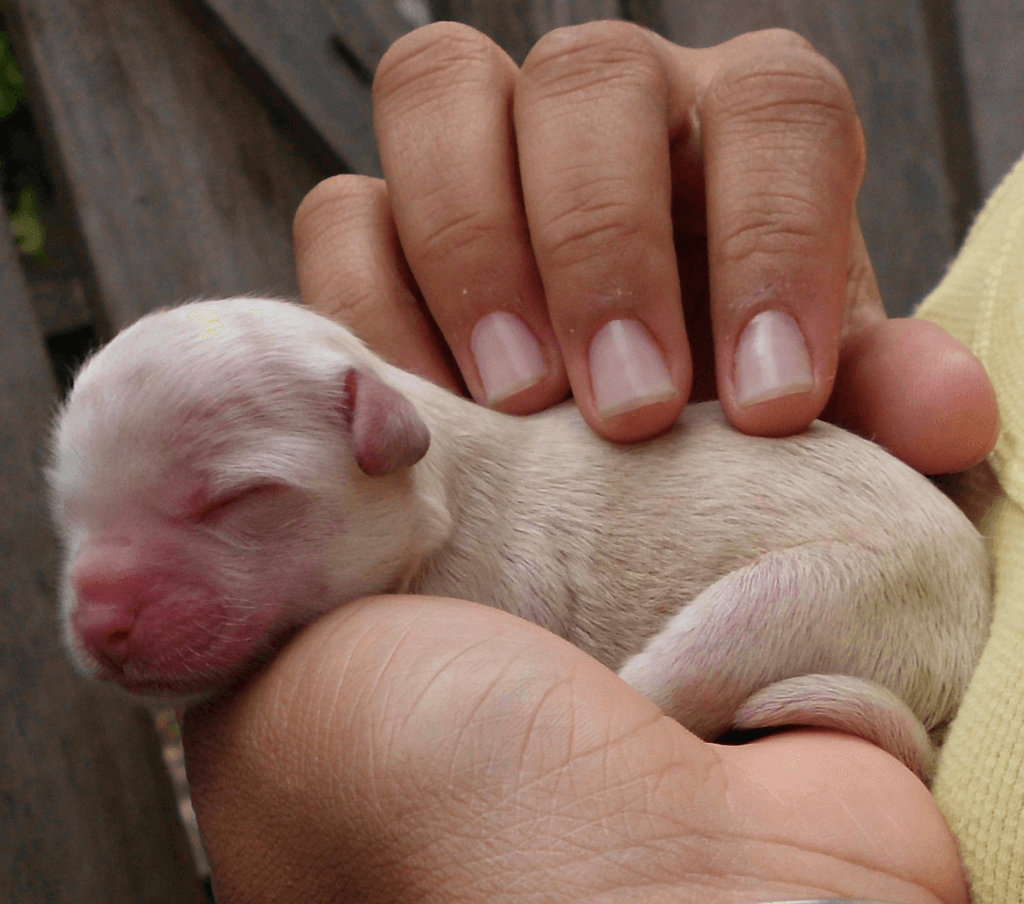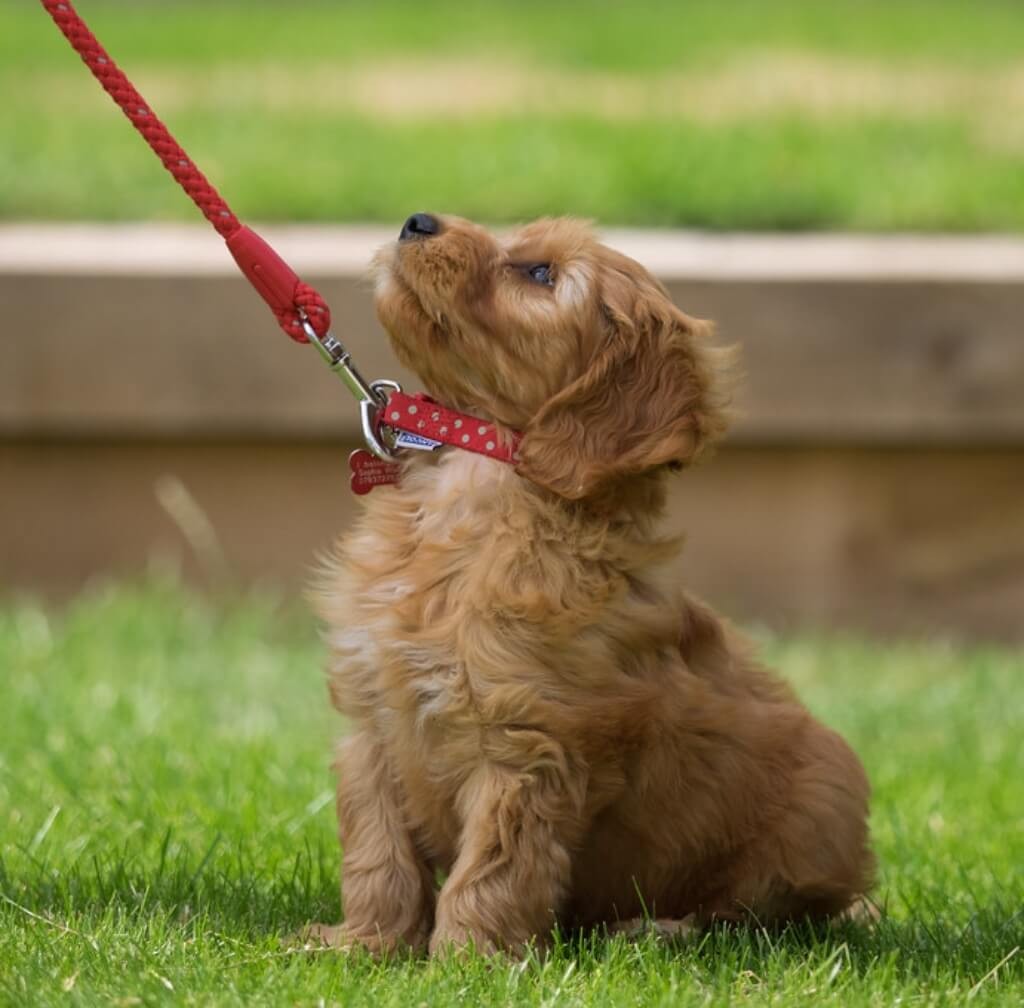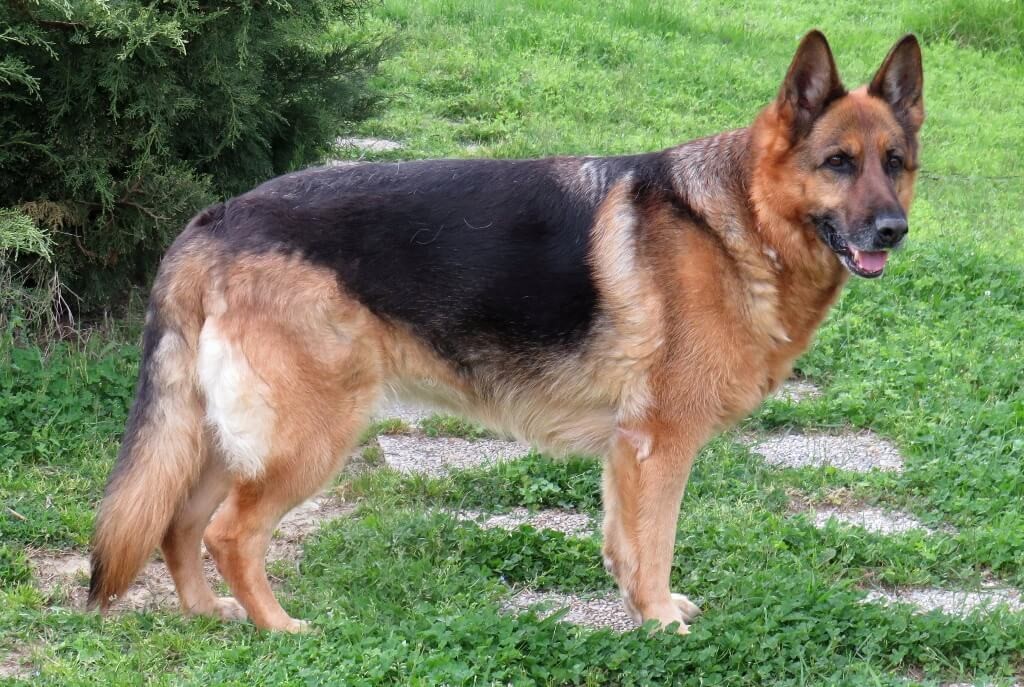Puppy Growth: When Do Dogs Stop Growing?

Puppies may be small and cute when you first bring them home but they grow very quickly. How fast puppies grow and the age they stop growing depends on multiple factors such as their breed.
During their development, puppies are particularly vulnerable to disease and have specific dietary requirements to ensure they are healthy. This guide will help you know what to expect as your puppy grows up.
The Age A Dog Is Fully Grown

Attribution 2.0 Generic (CC BY 2.0) - Jonathan Kriz
Generally, a dog is fully grown at around 1 year old. However, this varies depending on the breed, age, and health of the dog.
Some smaller dogs can be fully grown at 8 months old while larger dogs may only be fully grown by 18 months old.
When Are Smaller Dogs Fully Grown?
Smaller breeds are fully grown by 8-12 months. Many of the small and toy dog breeds will not physically grow anymore after around 8 months old.
When Are Larger Puppies Fully Grown?
Large dog breeds are generally fully grown by 15-18 months old. Larger dogs grow at a slower rate but most reach their full size by 18 months.
Some giant breeds may not be fully grown until they are 2 years old.
When Are Medium Puppies Fully Grown?
Medium breeds are usually fully grown by 12-15 months old.
Puppy Growth Stages

Attribution-ShareAlike 3.0 Unported (CC BY-SA 3.0) - Marciomarcio31
Puppies experience a lot of developmental milestones in the first few months of life.
0-3 weeks
Puppies experience a lot of milestones in the first 3 weeks of life. Their eyes will open when they are between 2 and 3 weeks old and their ears will completely open by the end of week 3.
At the end of week 3, puppies can stand and sit up, they begin to interact with their littermates, and their baby teeth start to develop. The weaning process can begin once their teeth erupt.
4-8 weeks
At 4 weeks old puppies start to become more active as their legs strengthen. They will also start to move away from their sleeping area to urinate and defecate.
At around 6 weeks old, puppies should be fully weaned onto solid food. Their daily food intake should be split into 4 small portions a day.
At this stage, puppies will start becoming playful and more independent. This is the time to start socialising and training.
8-12 weeks
As your puppy continues to grow and develop their coordination will improve and they are eager to explore. This is the age most puppies go to their new owners.
Training and socialisation are vital during this time and help owners build bonds and develop trust with their new puppy.
3-4 months
At 3-4 months old, puppies are full of energy and extremely playful.
Common training necessary during this time includes toilet training, handling and teaching puppies not to play bite. Puppies at this age require lots of stimulation and training.
This is also the age when meals can be reduced from 4 servings to 3 a day. This means slightly larger portions per serving.
4-5 months
Between 4-5 months puppies will be walking more steadily as their physical coordination improves. They are becoming increasingly independent and establishing their own unique personality.
Puppies will start to lose their baby teeth by around 5 months old. They can go for short walks and often enjoy playing interactive games such as fetch.
5-6 months
At this age, puppies start to become sexually mature. Meals can now be reduced to twice a day.
By 6 months old many smaller breeds are almost fully grown while medium breeds will have reached ⅔ of their adult weight. Most larger breeds will be around half their final weight.
6+ months
Your puppy will continue to develop and mature until they are around 18 months old. At 7 months puppies will have all of their adult teeth.
Between 6-8 months old puppies become sexually mature and females will have their first season.
The Factors Impacting Puppy Development

Attribution 2.0 Generic (CC BY 2.0) - William Warby
There are five key factors that have a direct effect on a puppy’s development.
Breed
The breed is one of the main factors that impact how big your puppy is going to be. Knowing the parent breeds and their sizes will help you to estimate how large your puppy will grow.
Smaller breeds tend to grow up quickly, they will often reach their adult size between 8-12 months old. Toy breeds may even reach their adult size by the time they are 6-8 months old.
Larger breeds take longer to grow and reach their full grown size between 12-18 months. Some giant breeds take up to 2 years to fully grow.
Purebred dogs are predictable in their growth rate and the breeder will be able to tell you how big the puppy will be. This makes it easier to plan and prepare for your new dog as you will have a good idea of its size, space, and feeding requirements.
Mixed breed dogs are much less predictable than purebred dogs when it comes to size. This means determining how big they are going to grow and their growth rate is very difficult. You can get a rough idea of the size by looking at the parent breeds but there is no way of accurately judging the size of mixed-breed puppies when they are young.
Gender
Male dogs tend to grow slightly bigger than females. If you’ve got a male puppy and you’ve noticed they are bigger than their female littermates, this could be why.
Feeding
The frequency of feeding and the quality of the food the puppy is fed will impact their growth.
Initially, puppies rely on their mother’s milk and puppies that are underfed or have not had their mother’s milk often have stunted growth.
Once weaned, puppies need to be fed complete food four times a day until they are 8 weeks old. This can be reduced to twice a day when they are 6 months old.
Quality of Care
Puppies need the right amount of food and exercise to grow and remain healthy. There are specifically designed foods to ensure puppies get the nutrition they need during this life stage.
Many puppy foods are also size-specific so shop for the right food for your puppy’s breed and size. This is important as large breeds are more sensitive to calcium levels in food and too much calcium can impact their development.
It’s important to feed puppy-specific food and follow the feeding guidelines so your puppy does not become underweight or overweight.
Equally, you need to ensure that your pup gets a nutritionally complete diet. While choosing own-brand products can help you save money, this may ultimately impact the quality of your dog’s diet if the ingredients are poor. That is why it is advisable to use a measuring cup to ensure your dog is getting the right amount of food whilst saving money. To learn more, read our dog ownership costs report.
Socialisation
Puppies have a key window of socialisation up to around 12 weeks old. During this time they will get used to new experiences and being around people.
This early socialisation period is one of the most important development stages for a puppy. Without positive socialisation, puppies can be fearful of unfamiliar places and new experiences.
How To Tell If Your Puppy Is Growing
Puppies often grow in spurts so they will have periods of slow growth in between rapid growth.
In the first 3-4 months puppies grow quickly. Signs of growth include:
Teeth: Puppies' baby teeth appear at around 3-4 weeks old. These eventually fall out and are replaced with adult teeth.
Ears: Puppy ears grow as they get older. Young puppies have soft velvet ears but this gradually disappears.
Paws: Puppy’s paws increase in size as they grow. This is particularly noticeable at around 6 months old.
Weight gain: Keeping track of a puppy’s weight is a good way to monitor its growth. Puppies gain weight quickly in the first few months of life.
What To Do If Your Puppy Is Overweight
If your puppy is overweight, start measuring their food accurately and feed at specific times of the day (don’t allow constant access to food). It’s also a good idea to increase playtime so your puppy is getting more gentle exercise each day.
If you’re already monitoring their food intake, chat with the vet about reducing the daily portion for a few days while your puppy gets to a healthier weight.
If your puppy is a good weight you should be able to feel its ribs and see its waist. When looking from the side, the puppy should also have a slight slope up from its stomach.
Encouraging Your Puppy’s Development
You can support your puppy during their development by:
Feeding them high-quality food designed for their breed and age
Offering toys that will help with teething, bite development, and overall oral health
Ensuring your puppy gets regular exercise but is not overexercised
Socialising them with people, dogs, and new experiences in positive ways
What To Do If Your Dog Stops Growing
If you are worried your dog has stopped growing too early, take them to the vet to rule out health issues. A dog’s size and weight are affected by their health and hormones so they may require supplements and veterinary support.
What To Do If Your Puppy Is Growing Too Quickly

Attribution-ShareAlike 4.0 International (CC BY-SA 4.0) - PROPOLI87
Puppies can grow too fast causing them bone and muscle issues. This is something that is quite common in larger breeds such as German Shepherds and Great Danes.
If your dog is growing too fast it may be experiencing pain, discomfort, restlessness, and have no desire to play or walk.
Take your puppy to the vet for a check-up and review their diet to ensure they are not eating food that is too rich in calcium or calories.
Looking For A Puppy?
If you’re ready to enjoy these milestones with a puppy of your own, use Puppies to find healthy dogs from reputable breeders.












